
Tendu Leaves:
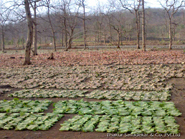 Tendu leaves are herbal and natural. We buy superior quality Tendu leaves from Maharashtra, Madhya Pradesh, Chattisgarh and Gujarat.
Tendu leaves are herbal and natural. We buy superior quality Tendu leaves from Maharashtra, Madhya Pradesh, Chattisgarh and Gujarat.
A bidi is made of well blended tobacco wrapped in tendu leaves. The tendu leaves need to be plucked when they are green. Then they are tied in bundles and left to dry in the sun. As the leaves dry they change their colour and once fairly dry the leaves are collected. Water is sprinkled on it and then the leaves are covered with a jute cloth. The heat from the ground and the coolness of the water and jute makes the tendu leaves soft and easy to roll at the later stage. This process is natural and does not involve any artificial or chemical process.
Tobacco:
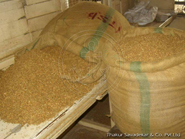 Tobacco is produced from the fresh leaves which fall under Nicotine category. Tobacco is an annual crop and the seeds are sown in cold frames or hotbeds to prevent attacks from insects, and then transplanted into the fields. After harvest, tobacco is stored to allow for curing, which allow for the slow oxidation and degradation of carotenoids. This allows for the agricultural product to take on properties that are usually attributed to the "smoothness" of the smoke.
Tobacco is produced from the fresh leaves which fall under Nicotine category. Tobacco is an annual crop and the seeds are sown in cold frames or hotbeds to prevent attacks from insects, and then transplanted into the fields. After harvest, tobacco is stored to allow for curing, which allow for the slow oxidation and degradation of carotenoids. This allows for the agricultural product to take on properties that are usually attributed to the "smoothness" of the smoke.
Finished Goods:
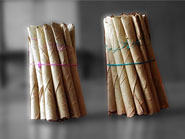 Bidi making is entirely a manual process. After we procure the tendu leaves and the fine blended tobacco, the skilled workers roll the bidi at one stroke with their fingers, flat at the smoking end and round at the lighting end. A quality control check is put through at this stage. The bidis are then roasted in charcoal fire in a specially designed Roasting Chamber to obtain that unique flavor. Each pack is made up of 20-25 bidis, tied with a thread; green thread denotes the brand “Langar Bidi” and red thread denotes the brand “Govind Bidi” which are wrapped inside a label, to make a pack. 20 such packs make a carton. Unlike most other tobacco products bidi is a completely natural product.
Bidi making is entirely a manual process. After we procure the tendu leaves and the fine blended tobacco, the skilled workers roll the bidi at one stroke with their fingers, flat at the smoking end and round at the lighting end. A quality control check is put through at this stage. The bidis are then roasted in charcoal fire in a specially designed Roasting Chamber to obtain that unique flavor. Each pack is made up of 20-25 bidis, tied with a thread; green thread denotes the brand “Langar Bidi” and red thread denotes the brand “Govind Bidi” which are wrapped inside a label, to make a pack. 20 such packs make a carton. Unlike most other tobacco products bidi is a completely natural product.
Packaging:
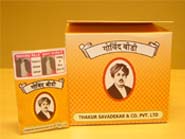
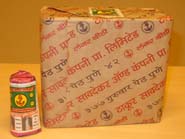
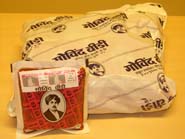
There are three methods of packaging, namely soft, hard and plastic. The soft packs are the most popular and widely preferred. The hard pack is especially made for the exports. The plastic packs are mainly used for the coastal and high rainfall regions to sustain the quality.